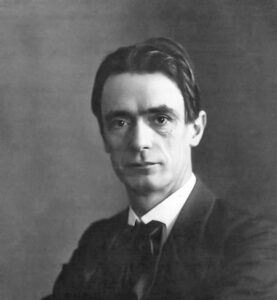Steiner was born in 1861 of Austrian nationality, in the part of the Austro Hungarian Empire now known as Croatia. He studied science and philosophy in Vienna and soon became a respected thinker, editing Goethe’s scientific works and publishing his philosophical treatise The Philosophy of Freedom in 1894. As a philosopher, scientist and social reformer, he extended scientific research beyond existing parameters of natural science to investigate the non-physical, spiritual realities of life. Using clear and accessible means for attaining spiritual knowledge, he offered insights that have inspired new approaches in many fields of contemporary practical life. He shared the results of his work in over forty books and six thousand lectures. Many of these works are available in the bookshop and/or library in Rudolf Steiner House.
During the course of his life, Steiner collaborated with doctors, therapists, farmers, business people, teachers, scientists and artists. These collaborations brought about waldorf schools, biodynamic agriculture, new economic and social models, the Camphill movement, anthroposophic medicine, artists, architects and many other initiatives that exist today in the UK and across the world (see the Initiatives page above).

The Anthroposophical Society
At Christmas 1923, Steiner founded the General Anthroposophical Society at the Goetheanum in Dornach, Switzerland as ‘an association of people whose will it is to foster the life of the soul both in the individual and in society, based on a true knowledge of the spiritual world’. Steiner became its president and at this event he provided a special meditation as a foundation stone and established the School of Spiritual Science.
The Society is in no sense a secret society, as membership is open to everyone regardless of religious belief, race, nationality, social standing, scientific or artistic conviction. Membership is therefore not dependent on agreeing with the results of his spiritual research. He was at pains to encourage individuals not simply to accept his ideas but to question, challenge and test them, in order to arrive at their own personal truth and conviction, as he considered freedom of thought to be fundamental to human existence.
The Anthroposophical Society in Great Britain was founded in Steiner’s presence in London in 1923 and in 1932 Rudolf Steiner House at 35 Park Road became its headquarters.
The Society not only embraces the activities that take place in the theatre and meeting rooms at Rudolf Steiner House but also the work and study in local groups across the UK, as well as the celebration of festivals, artistic performances, courses, trainings, lectures and major national and international conferences. It is funded by its members who are asked to make an annual contribution to support its work. Governance of the Society lies with the Council who, together with the Honorary Treasurer and General Secretary, are appointed by its members.
For more information about becoming a member of the ASGB click here.
